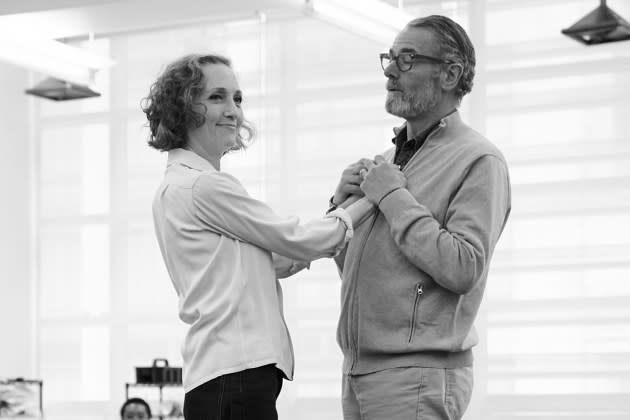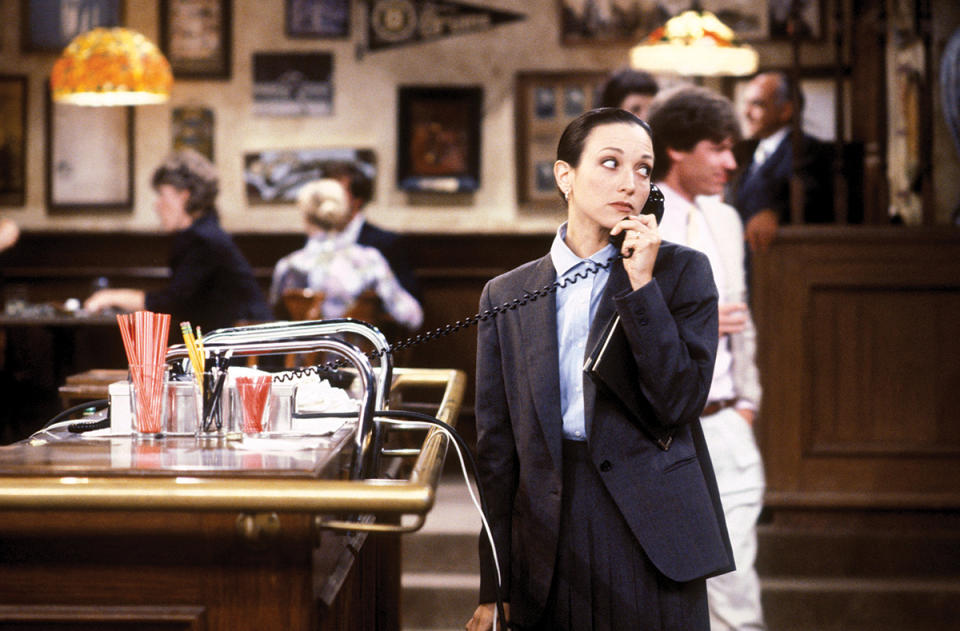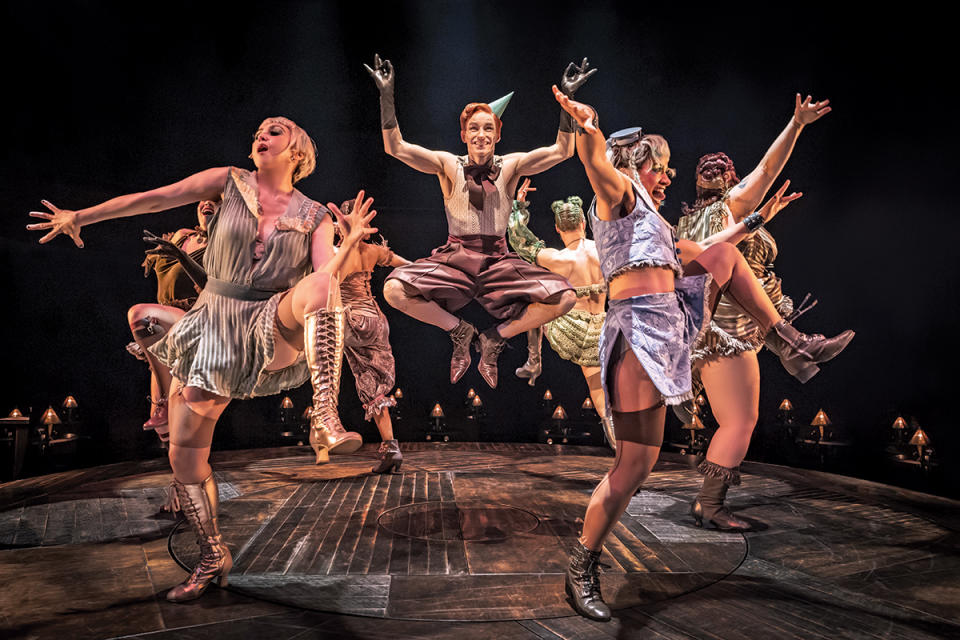Life Is a ‘Cabaret’: Bebe Neuwirth’s Latest Role Is a High-Stakes Broadway Homecoming

Bebe Neuwirth calls herself a “theater rat.”
So it’s natural she’d be sitting in an old-school New York diner on Eighth Avenue, on the edge of the Broadway district, right around the corner from where she’s in rehearsals for her latest show, “Cabaret at the Kit Kat Club.” Less than two weeks from its April 21 opening, Neuwirth’s midday order is a simple one: English breakfast, hot and black. She doesn’t need the overflowing pile of creamer the waiter brings, but she’ll take that little dish for her teabag.
More from Variety
'Cabaret' Review: Eddie Redmayne and Gayle Rankin Lead High-Style Revival That Cuts to the Bone
'Hell's Kitchen' Review: Alicia Keys Musical Brings a Vibrant Depiction of Teen Girlhood to Broadway
How Broadway's 'Cabaret at the Kit Kat Club' Pulls Off Its Audacious, Sensual 75-Minute Prologue
Once that’s settled, she explains how she scored the part of Fr?ulein Schneider, the owner of a boardinghouse in 1930s Berlin whose late-in-life romance with a Jew suddenly turns dangerous: She auditioned, just like everyone else.
Given all the trophies on her shelf (she’s won two Tonys and two Emmys), Neuwirth doesn’t often have to audition — in fact, some actors with bigger egos would find the ask insulting. But Neuwirth has the attitude of a performer who values the work above all else.
“My agent was so apologetic about it, but I kept saying, ‘It’s fine, it’s absolutely fine,’” she says. “I like to audition.”
Smaller than you might imagine her, Neuwirth moves with the precise spatial awareness you’d expect of someone with a lifelong background in dance — instead of a handshake, for instance, she rises from her chair for a waggish curtsy — but that kind of grace feels so effortless on her you almost don’t notice. Sporting naturally graying shoulder-length hair and loose-fitting black clothing, she’s so comfortable and self-effacing it’s easy to forget that, along with being a theater rat, she’s also a big TV star, who earned fame with her peerless ability to deliver a punchline with a particularly sardonic flair.
“Bebe is an extraordinary technician, and that’s the highest compliment from me,” says the composer John Kander, who wrote “Cabaret” with his longtime partner, the late Fred Ebb. “Freddie and I always said that for people like us — the people who make stuff — instead of thinking of ourselves in highbrow ways, we really ought to think of ourselves as carpenters, as technicians, as professionals. Bebe has that in spades.”
He should know. His long association with Neuwirth began when she headlined the 1996 revival of Kander and Ebb’s “Chicago” with a Tony-winning star turn as Velma Kelly, the sharp-tongued vaudevillian-murderess for whom scandal is just another path to fame.
That production turned an often-overlooked musical into a high-profile classic that has become the longest running Broadway revival in history. For several years, the actress returned regularly to the role of Velma, and then, as she got older, she stepped in as Roxie and then Mama Morton.
That’s just one facet of a long history in the theater that began when she was a teenager. Raised in Princeton, N.J., she started dancing at 6. When she was 13, a Broadway performance of “Pippin,” directed and choreographed by legend Bob Fosse and starring Ben Vereen, changed her life.
“I went with my first boyfriend, and we were up in the gods,” Neuwirth recalls, using theater slang for the cheap seats far back on the highest balcony. “I had no idea who Bob Fosse was, but I felt a deep longing for what those dancers were doing. I felt drawn to it almost physically. It was like recognizing myself.”
She spent a year at Juilliard before dropping out. “I didn’t want to go to college. I wanted to start dancing,” she says, and quickly scored her first professional job in “A Chorus Line.” She went on to appear in several dance-centric musicals, including “Sweet Charity,” in which she played Charity’s friend Nickie, the part that yielded her first Tony.

For TV viewers, Neuwirth is probably most recognizable as Dr. Lilith Sternin, the sitcom character she’s played on and off for 37 years, first on “Cheers” and then its spinoff “Frasier,” most recently revisiting the role just last year in the Paramount+ revival of the latter.
But back when the producers of “Cheers” called with that first offer to expand her role on the show, she almost didn’t accept it — because she worried that it might take her away from the theater.
“I didn’t want to do television,” she says. “But ‘Cheers’ was a great show.” She adds that Lilith, the uptight, socially awkward psychiatrist, offered a departure from the kinds of roles that had distinguished her career until then.
“Usually, and especially at the time, the leading lady in a musical is a soprano ingénue,” she says. “But she’s got a best friend who dances great, she sings great, she belts. And she’s tough as nails with a heart of gold. That was my part. That’s Nickie in ‘Sweet Charity.’ Lilith was so not that.”
Still, she hesitated. So she called four people for advice. Two of them were Broadway royalty: Fosse and his partner-muse, Gwen Verdon. (The other two were her parents, a mathematician and a painter.) Neuwirth had worked with Fosse and Verdon on “Sweet Charity.”
“They both reassured me,” she says. “Bob told me, ‘You’ll be like Jack Klugman! You’ll go off to do TV, and then you’ll come back to the theater.’”
They were right, of course. Theater remained center stage in her life even as Lilith became a recurring character on “Cheers,” then a regular, and an occasional presence on “Frasier.” Along the way, Lilith and Frasier, the character played by Kelsey Grammer in both series, began a tempestuous relationship, married, had a child and eventually divorced.
Lilith has proven the most enduring success in a long, consistent career of Hollywood work, which has landed Neuwirth, 66, at a point in her life where she has the freedom to take a job only if she really wants to do it. “I’m very, very privileged and fortunate in that regard,” she says, adding with a twinkle, “At least, today it’s like that. Tomorrow, the pogrom. So who knows?”
That sly sense of humor is one of Neuwirth’s standout traits, according to her friends and colleagues. The director of “Cabaret at the Kit Kat Club,” Rebecca Frecknall, recalls a recent rehearsal under observation by a visiting journalist. Everyone in the room was on their best behavior. “Bebe came up to me with this cheeky smile and said very quietly, ‘What if I just cried out really loudly, “You want me to do what?!”’” Frecknall remembers with a laugh. “She has this incredible way of undercutting a moment in a really funny way.”

The stakes are high for this “Cabaret,” which arrives as one of the most hotly anticipated shows of the season. The ambitious production with a reported $24 million price tag has radically transformed the August Wilson Theatre into an in-the-round performance space with cabaret tables, balconies on two sides and luxe concessions. The production’s 2021 premiere on the West End won seven Olivier Awards including one for Eddie Redmayne, now reprising his part on Broadway.
To the role of Fr?ulein Schneider, Neuwirth brings both a world-weary resolve and furtive hopefulness. She’s proud to have survived all that she has, but still carries the quiet regret for the sacrifices she’s had to make along the way. At a pivotal moment in the play, she has to decide whether or not to make one last terrible sacrifice. “You have to really believe that this is someone who’s a survivor and fighter, and I feel like Bebe herself carries that with her,” Frecknall says.
Although so much of Neuwirth’s stage work has taken advantage of her movement background, she dances very little in “Cabaret at the Kit Kat Club.” As a hoofer who danced through two hip replacements over the years, she’s not doing much dancing at all these days.
“I wiggle a lot,” she says with a smile. “But I don’t dance with the athleticism that I did before. I do think that a lifetime of dance, in a body, is a beautiful thing to watch, even with subtle, smaller movements. I like to say that even if I’m not dancing, that doesn’t mean I’m not dancing, because I’m feeling it in a very physical way.”
Her performance in “Cabaret” is galvanized in part by the contemporary relevance of a story about people torn between moral stances and survival in the face of rising fascism and antisemitism. “I can’t believe I’m saying this, but there are actual Nazis out there proudly now, without apology, not hiding it,” says Neuwirth, who is Jewish. “And that’s just too big to comprehend. But it is something that we do have to face.”
Looking past the opening of “Cabaret” and the flurry of awards season in May and June, Neuwirth doesn’t know what’s next after her stint in the show ends. Whatever the future holds, though, she knows theater will be in the mix.
“It was Martin Charnin who first called me a theater rat,” she says, mentioning the Broadway veteran who wrote the lyrics to “Annie” and directed the original production. “Those are the smells that I’m comfortable with, and that’s the animal I am.”
Best of Variety
Sign up for Variety’s Newsletter. For the latest news, follow us on Facebook, Twitter, and Instagram.
